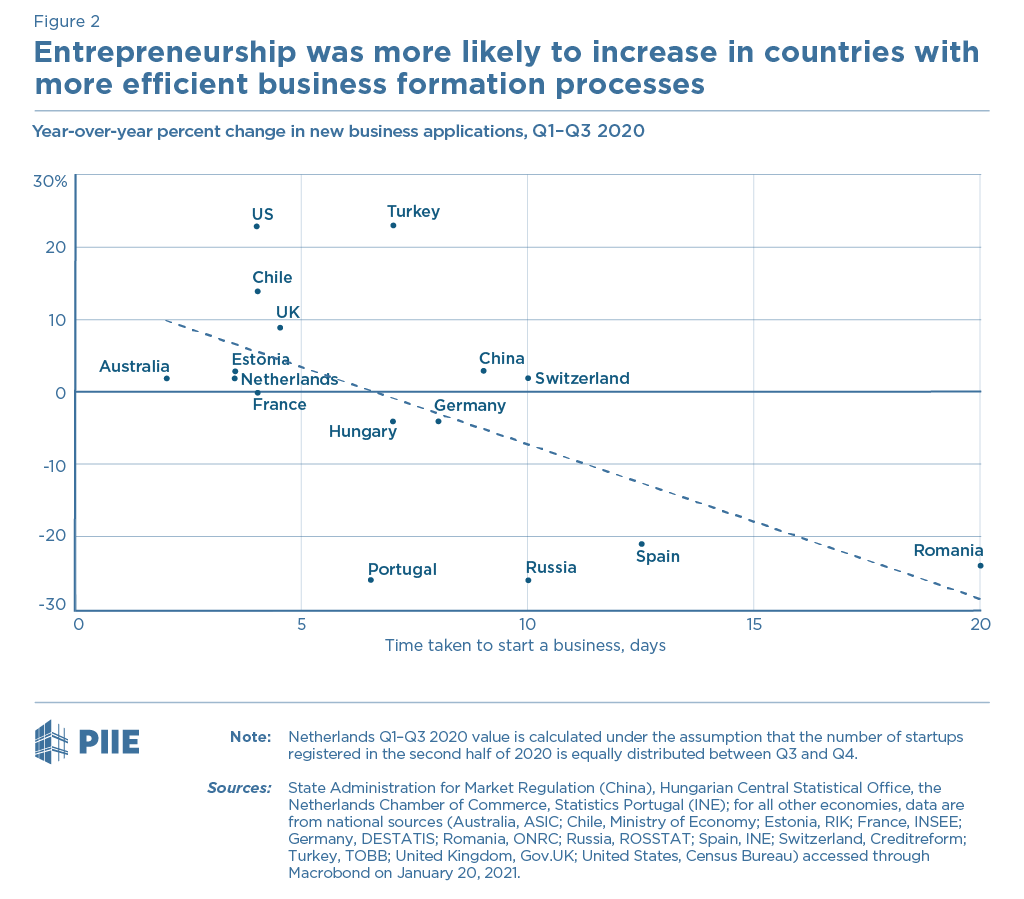Business Start-ups amidst COVID-19: How the pandemic helped us prosper over the last year.
By: Natalia Sosa

Importance and role of start-ups amidst COVID-19 in the economy
Last year was a tough one for many aspects of the economy, the pandemic brought many challenges to organizations in many industries that they had to act in the quickest way possible to get through it. Unfortunately, many companies did not survive, especially those that did not have the right and adequate resources to keep up. That was the case of many start-ups that were shocked more severely in the first months of last year than other companies. That was mainly because of their special conditions and vulnerability to Covid-19 challenges. In this article, we will try to explain how and why business start-ups amidst COVID-19 strive to survive the crisis.
Start-ups tend to involve themselves in high-risk activities and address many barriers in the traditional financial system. This leaves them with scant liquidity to confront a slowdown in demand or even invest in their rebranding with new technologies needed to stay on the float during a crisis. The fact that many of those business start-ups amidst COVID-19 closed is alarming since they play a key role in the economies.
In the countries that are part of the OECD, young firms account for about 20% of employment, and on average, they create almost half of new jobs1. Besides, they contribute significantly to productivity and innovation in their economy. All of this makes them essential to recover from the pandemic, and a crucial topic of discussion for governments. Some governments have taken specific actions like France, who has “set up a 4 billion euros fund to support start-up aid liquidity”1, Germany on its side “has announced a tailored start-up aid program, expanding and facilitating venture capital financing”1 and the UK “has announced a co-financing fund for innovative companies facing financial difficulties”1.
What happened with start-ups in 2020?
There was concern about all the start-ups that were not going to emerge after Covid-19. In the early months of 2020, there was an important decline in the creation of new businesses in many countries as you can see in the graph below.

Australia, France, Hungary, Netherlands, Portugal, Turkey, and the United States, presented a decrease of more than 10% in business registrations during the first quarter of 2020. This was predicted to have an important impact on employment in subsequent years as demonstrated by a simulation that “evaluates the effects on employment over 3 to 14 years of a 20% reduction in the number of new businesses’ creation”1. This simulation suggested that a 20% reduction would lead to a 0.7% of aggregate employment loss 3 years later after the impact and even 14 years later it could have an impact of 0.5%.
However, last year was full of surprises as some trends at the beginning of the year pivoted during the next months. Despite all the negative perceptions about the business start-ups amidst covid-19, the numbers started to leverage in the next quarters of 2020. The United States, for example, showed a 24% growth in the number of new businesses by the third quarter of the year. These numbers also changed positively for countries like Chile, Turkey, and the United Kingdom, whereas for countries like Portugal and Russia the start-up activity kept decreasing and in countries like China, it grew barely 3%.

At first sight, everyone thought that to keep unemployment as low as possible, governments needed to spend all their resources in helping existing companies to retain their employees. Nonetheless, research has discovered that are new businesses the ones that generate more employability than existing ones. The United States was one of the countries that acknowledged this early and supported the creation of new business start-ups amidst covid-19, by offering them loans under the “Paycheck Protection Program”. These loans could be forgiven when certain conditions were met, and by august last year, the US government had approved credits under $50,000.
Other countries followed that example and create programs to support start-up creation. The United Kingdom, for example, created a fund for start-ups called “Coronavirus Future Fund” and gave loans ranging from 125.000 to 5 million pounds. By the end of October 2020, the government had approved 800 million pounds in loans for 745 companies. Chile also created a program called “Startup Ciencia” that provided new technology companies “with equity financing for up to 85 percent of overall equity with a ceiling of 220 million pesos ($300.000).
At the end of last year, those countries that invested in aid programs for business start-ups amidst covid-19 saw an increase in the creation of new businesses. The US hit the list with 23% growth, followed by Turkey 23%, Chile 14%, and the United Kingdom 9%. In contrast, countries like Romania, Portugal, Russia, and Spain showed a slump in the number of businesses start-ups created in 2020.
The reasons behind start-up emerging in a time of crisis
With every crisis comes a change in customer preferences because of the new circumstances it brings to the economy. Some of these changes were seen as opportunities for many start-ups that were born thanks to that change of trends and customer preferences. For example, during COVID-19 the retail sector grew because online shopping achieved unprecedented levels. This high demand for online items is the first reason behind the creation of new businesses start-ups amidst the COVID-19 crisis. A good illustration of this is that in the United Kingdom 20% of new businesses were created in the retail sector by the end of 2020. That same period, internet sales went from being 19% to 33% of all retail sales, which supports the idea that the growing demand for online items sustained the creation of many start-ups in this specific retail sector.
A second reason that explains the business registration rates success of some countries is that they offer the fastest and easiest environment for start-ups to start their business. It is demonstrated that countries with the fastest processes to start a business are more likely to experience growth in business creation during crisis times as is shown in graphic2. This correlation demonstrates that countries should simplify their procedures to start a business in their countries if they want to support business creation, which in turn would help to downsize the effects of the crisis under unemployment.

A third reason why start-ups emerge during a crisis is because of the need to generate some kind of income during times were unemployment gets high. This means that at some point unemployment rates can be used to predict increases in the entrepreneurship sector. This is a very special field of start-ups called “entrepreneurship by necessity” and has different conditions than any other start-up.
To summarize this section, both things, unemployment, and government facilities and benefits impact greatly the emerge of business start-ups amidst covid-19 and in general, amidst any other crisis.
What does the future look like for start-ups after COVID-19?
Even though many small businesses were temporarily or permanently closed during the pandemic, some of them shifted to new technologies investing in digital applications. This change happened to be not only their salvation but also a source of growth that they could have never imagined before the pandemic.
The pandemic was an occasion to realize that many opportunities come along with crisis. Many successful businesses have emerged from difficult situations as is the case of Dropbox, Uber, Airbnb, Whatsapp, Groupon, and Pinterest. Business start-ups amidst covid-19 can creatively find solutions to the crisis or to the needs that arise from that crisis, establishing a whole new industry or product and becoming first entry innovators. Examples of these opportunities during covid-19 happened in the areas of telemedicine, teleworking, medical equipment, home delivery, e-commerce, online education, etc.

Experience taught us that crises come with certain patterns we should understand and learn about to face a future crisis. The graph, for example, shows similarities between firm deaths and employment losses associated with periods of recession from 1980 to the end of 2015. It is worthy to note that both variables seem to have a positive correlation between them, which means that firm deaths relate positively to unemployment losses. But please be aware we are talking about already established businesses, not start-ups since as we talked earlier it is this same unemployment that brings up many “entrepreneurship by necessity” start-ups.
According to Schumpeter, “new businesses may make existing industries more efficient as well as create entirely new industries. Governments can ease their path”2. However, there is a fear that many start-ups that came out as entrepreneurship by necessity are turning to the gig economy (“a free-market system where organizations and independent workers engage in short-term work arrangements”2). The gig system encompasses freelancers, consultants, independent contractors and professionals, and temporary contract workers. These jobs are expected to prevail after covid-19 and even increase in demand.
Tips and lessons from successful business start-ups amidst COVID-19
The World Economic Forum shared some insights of the lessons that covid19 left to 10 start-ups3.
- Move fast and fix things: Machine Metrics, an industrial IoT platform, duplicated their remote technology monitoring during covid-19 to help their customers monitor their factory productivity and supply chains from distance. To achieve this, the company had to develop educational programs and mechanisms in one week and rely on its agility and organizational trust. These strengths were crucial to building Machine Metrics success.
- Learn first act later: Andres Kunze, CEO of Konux, a technology company that uses artificial intelligence to support predictive maintenance of industrial plants says an entrepreneur should “rethink the core of the business to help him focus on the company’s strength”3.
- Find new problems to solve: Orbs, a start-up that develops blockchain applications detected an opportunity to offer a service that helped governments to prove the authenticity of the health condition of individuals while securing their privacy. The company designed a blockchain health passport in which test results can be signed cryptographically. With this information, countries can determine who and in which conditions people can enter their territories. This experience taught Orbs that the challenge is “identifying the opportunity within a crisis”3.
- Know your why: Avellino is an example of a start-up that changed its business model during crisis pivoting from genetic data and diagnostics to testing the market for covid-19. This change was possible in only 3 weeks thanks to the agility of the team to align their purpose and priorities.
- Find ways to foster community: Mooofarm has a platform that supports marginalized dairy farmers to share and learn from each other about the cattle. The company is also developing an online community to help to strengthen the bonds between dairy farmers.
- Rethink business as usual: 3YourMind, a 3D printing company saw an opportunity to generate PPE and respirator connectors with its technology. This change helped the company to secure the future of its business.
- Strengthen relationships: Diginex, a financial service, and blockchain company went 100% remote because of the pandemic. The company had to standardize “its product offering to enable rapid scale-up of its technology”3. This approach allowed them to focus on its strength and lean on their relationships with partners to achieve their remote transition successfully.
- Get creativeLivinguard, a fabricator of innovative face masks and other PPE(personal protective equipment) had to find a way to scale up their business while ensuring the health and safety of their staff during Covid-19. The company found a small location where there was no full lockdown and it could run some key operations there while other staff worked from home.
- Leverage your capabilities: Contextere, a machine learning and industrial data company found the pandemic as an opportunity to advance productivity initiatives it couldn’t have imagined before. The company used its technology to helped their own team to be more efficient, eliminating rework and identifying new opportunities to contribute to easing the covid-19 consequences.
- Embrace new challenges and new opportunitiesMIZA, a fintech company that “helps support small and medium enterprises in the MENA region”3 to get access to finance. This was a big problem to start-ups and SMEs before the pandemic and got even worst with the imminent inbound of covid-19. The company, however, realized that with digitalization, small enterprises and start-ups could benefit from their digital tracking record to get financial access and this helped them to support business start-ups amidst covid-19.
How start-ups amidst COVID-19 are related to development?
There is no doubt that SMEs and start-ups play a vital role in economies generating jobs and innovation. They are specially connected to fast-moving sectors such as Information and Communications Technology which is highly benefitted by global standardization. Standardization enables them to keep a fast pace of innovation, broad competitive technology transfers, access to a variety of markets, and coordination.
However, according to 2015 Ernst & Young review of the European Standardisation System “Despite representing 99% of the (European) market, SMEs appear to have individually very limited resources to invest in standardisation and therefore experience difficulties in participating, while their business can be highly impacted by standardisation work”5. This could be mainly because start-ups face barriers as lack of recognition from bigger players, technical capabilities, participation legitimacy, and differences in interests. The Secretary-General of the European Association of Digital SMEs stated that “multinational companies impose technical solutions and requirements that are less in line with SMEs’ needs”5.
A study made by Kirti Gupta found that 34% of the start-ups and 52% of other firms have made contributions to the development of 3G and 4G standards during 2005 – 2014. On the other hand, the study found that start-ups contributions between 2005 – 2014 had a 34.42% of likelihood to be accepted, whereas other businesses had only 28.91%. This data is very interesting having in mind that for that same period, the number of contributions from other companies was 72 times higher than contributions from start-ups and SMEs.
The study concludes that start-ups and SMEs are interested in participating in the process of standardization and that those who do participate have a higher acceptance probability.
Another study led by Joanna Szarek and Jakub Piecuch found a correlation between the number of start-ups and the level of innovation of the economy. And in the long run, a start-up that remains in the market can even contribute to increasing the GDP of the country where it operates, creating new jobs, decreasing unemployment, and uplifting the living standards of the society. In the table below are presented the top 20 companies with a better start-up ecosystem according to the following criteria: efficiency, funding, market range, talent, and experience.
In their initial stages, start-ups usually hire 1 to 10 people, but there are also a few that hire more than 10 people. Over 8% of people employed by start-ups indicated an increase in job positions but they find disadvantageous the fact that almost half of the start-ups don’t offer permanent work contracts. Another interesting finding made by Szarek and Piecuch was that only 14% of the respondents had patented. However, half of the surveyed created innovative products on a global scale and over 30% considered their product as precursory on a local scale
Finally, the studies showed a correlation between economic growth and the number of start-ups companies of a country, something we already talked about. But the novelty of this study is that there is also a positive correlation between the number of patents and the economic growth of a country. So start-ups innovation processes and consequently patents should be boosted by governments. Especially those in areas that tend to be more resilient to covid-19 effects and contribute more to the creation of jobs, such as digital technology start-ups.
Tags:









